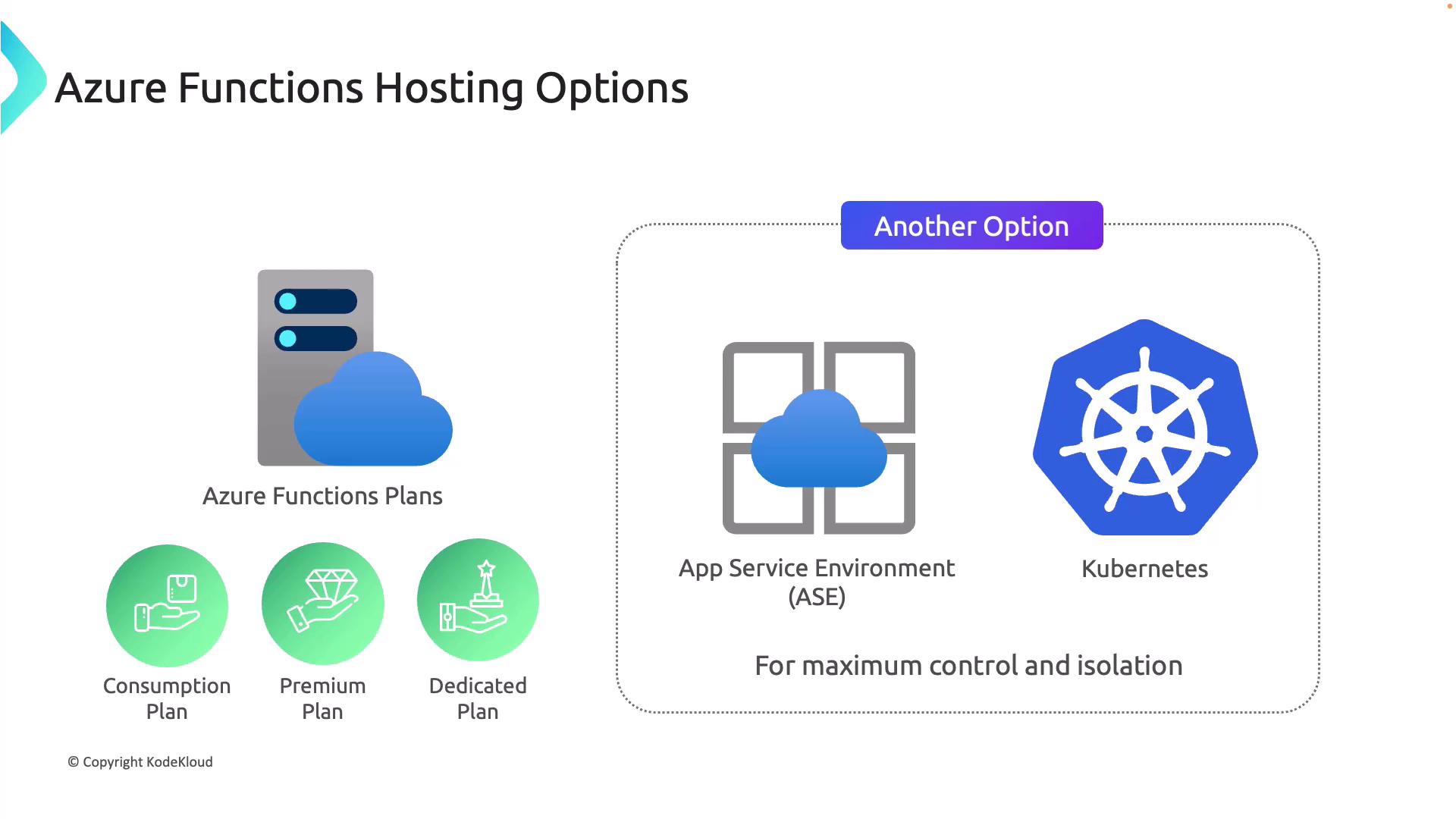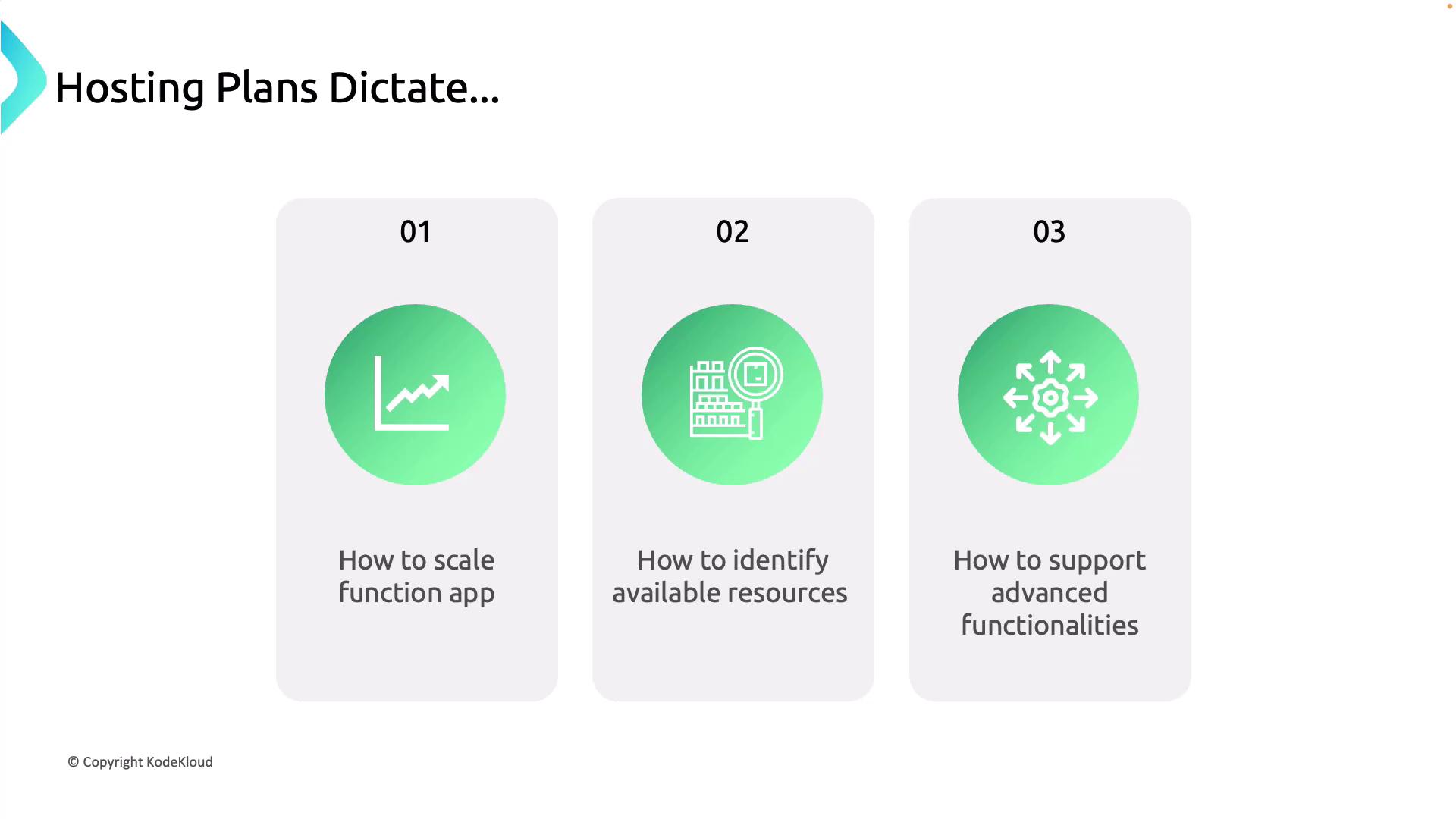AZ-204: Developing Solutions for Microsoft Azure
Exploring Azure Functions
Azure Functions Hosting Options
Discover the various hosting options available for Azure Functions and learn how to choose the ideal environment based on workload demands, performance requirements, and budget considerations.
Azure Function Plans
Azure Functions supports several hosting plans. Each plan delivers unique benefits and limitations that can impact your application's performance and cost. Understanding these plans will help you make an informed decision for your deployment needs.
Consumption Plan
The Consumption Plan is designed for cost efficiency as you are only charged for the actual time your functions execute. It automatically scales to handle variable workloads, making it perfect for unpredictable or bursty traffic. For example, if you run a C# function that takes 20 seconds to execute, you are billed only for that duration. Running two functions consecutively for 20 seconds each results in billing for 40 seconds of execution time.
Key Benefit
The Consumption Plan is ideal for applications with intermittent or low traffic where cost savings are prioritized over immediate startup speed.
Premium Plan
One of the limitations of the Consumption Plan is the "cold start" issue, where new instances incur a startup delay. The Premium Plan resolves this problem by providing pre-warmed instances. It also offers advanced capabilities such as Virtual Network integration, extended execution times, and the ability to leverage more powerful hardware. Note that while this plan supports auto scaling, you are billed for the provisioned pre-warmed instances, regardless of active request handling.
Considerations
When opting for the Premium Plan, be aware that the higher cost is justified by its advanced features and improved response times, which may be crucial for latency-sensitive applications.
App Service Plan
Azure Functions can also run on an App Service Plan, which is the same dedicated hosting option used for traditional web apps. If you already have an Azure App Service running on a Standard (S1) plan with spare capacity, deploying a Function App within that plan could help you reduce costs by sharing resources among web apps, APIs, mobile backends, and Azure Functions.
App Service Environment (ASE)
Running your Function App on an App Service Environment (ASE) provides a fully isolated and dedicated environment with enhanced security and control. This option is especially beneficial for applications that require strict compliance, high security, or regulated performance environments. If your isolated plan has sufficient capacity, integrating Azure Functions into your ASE can be an efficient way to leverage existing infrastructure.
Kubernetes

For maximum control over your deployment, consider deploying Azure Functions on Kubernetes. This option is ideal for enterprise scenarios and hybrid or multi-cloud environments, ensuring consistent execution across various platforms while enabling seamless scalability and management.
Impact of Hosting Plans on Function Behavior
The hosting plan you select for your Azure Functions significantly influences several core aspects of your app's behavior. Below are the critical factors affected by your choice:
- Scaling: Some plans offer automatic scaling based on demand, while others have fixed capacity.
- Resources: The plan determines the allocation of memory, CPU, and other compute resources. For memory-intensive applications, the Premium Plan or a dedicated App Service Plan is often more suitable than the Consumption Plan.
- Advanced Functionality: Capabilities such as Virtual Network integration and advanced authentication can depend on the hosting plan selected.

By aligning your hosting plan with your specific application requirements, you ensure optimal performance and operational efficiency.
Scaling Options in Azure Functions
Understanding the relationship between your chosen hosting plan and scaling capabilities is crucial. Once you have reviewed the features of each hosting option, the next step is to delve into the scaling mechanisms available within Azure Functions. Effective scaling ensures that your functions can handle varying workloads efficiently while maintaining performance and cost efficiency.
For further details and best practices on scaling Azure Functions, refer to the official documentation.
Explore how Azure Functions can empower your projects by offering flexibility, scalability, and seamless integration with other Azure services. Whether you prioritize cost, performance, or control, there is a hosting option to meet your needs.
Watch Video
Watch video content